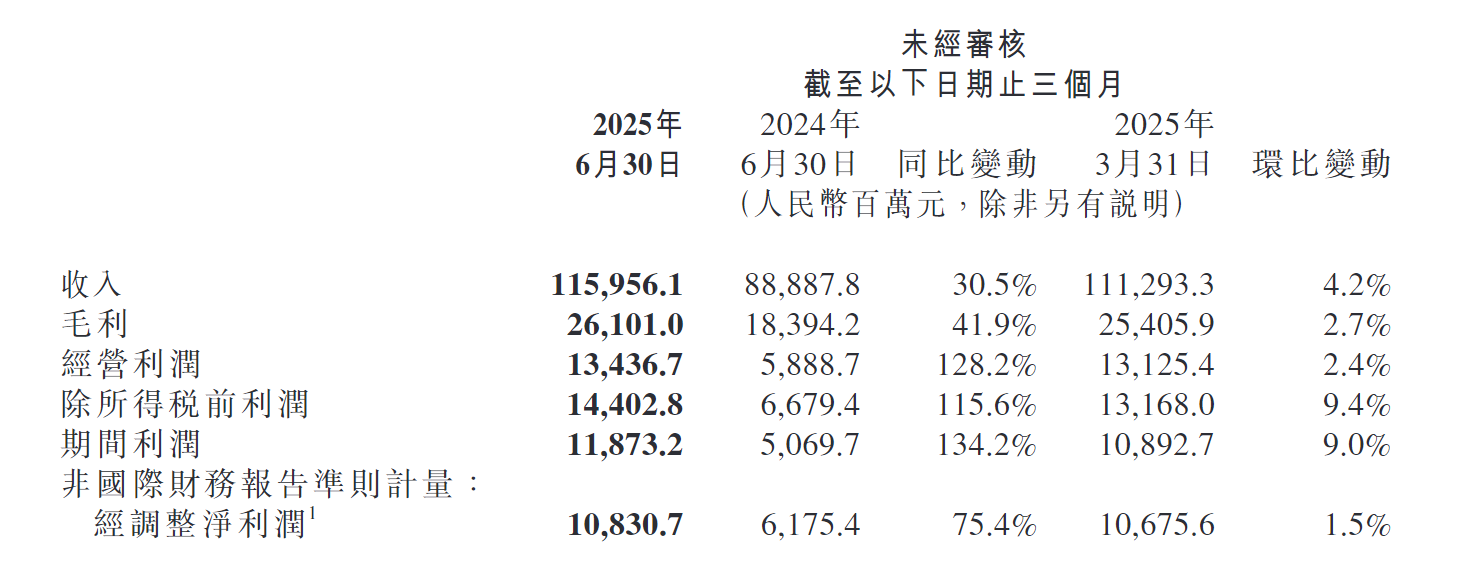On August 19, Xiaomi delivered a groundbreaking second-quarter financial report, which not only broke its own historical record, but also further established its leading position in the global intelligent manufacturing and technology ecosystem.
Data showed that Xiaomi achieved total revenue of 115.956 billion yuan (RMB, the same below) in the quarter, a year-on-year increase of 30.5%, higher than market expectations of 114.939 billion yuan, and adjusted net profit reached 10.831 billion yuan, a year-on-year surge of 75.4%.

What is most eye-catching is the leap forward performance of its innovative business.In the second quarter of 2025, Xiaomi's revenue from innovative businesses such as smart electric vehicles and AI reached 21.3 billion yuan, accounting for a significant increase in the group's overall revenue.
Among them, the automotive business contributed 20.6 billion yuan, becoming the core growth engine second only to the traditional smartphone business.It is worth noting that Xiaomi delivered a total of 81,302 new vehicles during this quarter, covering its first SUV product, the Xiaomi YU7 series, including the YU7, YU7 Pro and YU7 Max, with a price range of 253,500 yuan to 329,900 yuan.Only 18 hours after the new car was launched, the number of lockings exceeded 240,000 units, and the market response far exceeded expectations.
Xiaomi's cross-border step is not a hasty move.As early as 2021, Lei Jun announced his strategic decision to enter the electric vehicle market.In the following years, Xiaomi continued to increase investment in research and development in core areas such as intelligent manufacturing, AI algorithms and high-performance batteries.According to public data, Xiaomi uses self-developed high-precision positioning algorithms and environmental awareness technology in its intelligent driving system, and is equipped with a large model system for self-training to provide underlying technical support for its smart cockpit and autonomous driving.
At the same time, Xiaomi has deployed rapidly in the domestic market. As of the end of June 2025, it has established 335 car sales stores in 92 cities, laying the foundation for subsequent channel expansion.It is foreseeable that with the launch of more models, Xiaomi Automobile is expected to become an important competitor in the domestic smart electric vehicle market, competing head-on with manufacturers such as Ideal, Xiaopeng, NIO and even BYD.
In addition to automobiles, Xiaomi's deep cultivation in the fields of AI and IoT also continues to achieve results.During the quarter, Xiaomi's IoT and consumer products business revenue was 38.7 billion yuan, a year-on-year increase of 44.7%, and gross profit margin increased to 22.5%.This is not only due to product diversification and category expansion, but also due to the upgrade of the smart connected experience.As of the end of June 2025, the number of IoT devices connected to Xiaomi's AIoT platform reached 989.1 million, a year-on-year increase of 20.3%.The number of users with more than five devices has also reached 20.5 million, showing strong user stickiness and ecological penetration.The monthly active users of Mijia App and Xiao 'ai Classmates both achieved double-digit growth, reaching 113.1 million and 153.2 million respectively.In terms of smart home appliances, Xiaomi has achieved significant growth, with air conditioner shipments exceeding 5.4 million units, refrigerators and washing machines reaching 790,000 and 600,000 units respectively, both setting record highs in a single quarter.Obviously, Xiaomi is continuously deepening its "mobile phone ×AIoT" strategy and gradually creating a closed-loop ecosystem of intelligent hardware with the family as the core.
In the field of smartphones, the traditional core business, although revenue dropped slightly to 45.5 billion yuan year-on-year, a decrease of 2.1%, global shipments maintained a slight growth, reaching 42.4 million units, a year-on-year increase of 0.6%.Canalys data shows that Xiaomi's global smartphone market share is 14.7%, ranking among the top three in the world.It is noteworthy that Xiaomi has jumped to first place in the Southeast Asian market, ranked second in Europe, the Middle East and Latin America, and ranked third in the African market.It can be seen that Xiaomi still has strong vitality in the international market.In terms of products, Xiaomi and REDMI brands continued to launch new products during this quarter, including the small folding flagship Xiaomi MIX Flip 2 and REDMI K80 Extreme Edition, which made breakthroughs in design, imaging system and performance configuration respectively, continuing their in-depth development of the mid-to-high-end market.
In addition, Xiaomi's wearable devices and tablet products have also shown rapid growth.In the second quarter of 2025, global shipments of Xiaomi tablets increased by 42.3% year-on-year, making it the fastest-growing company among the top five manufacturers in the world.In terms of wearable devices, wristband shipments rank first in the world, and TWS headphones rank second in the world.In terms of hardware innovation, Xiaomi also released its first AI glasses, which integrate a 12MP optical lens and an open audio system, and support real-time video calling and live broadcast functions.The product design emphasizes lightness and personalization, and the electrochromic function is rare in the industry, providing a new application paradigm for AR/AI wearable devices.
In terms of Internet services business, Xiaomi has also achieved steady growth.Revenue for the quarter reached 9.1 billion yuan, a year-on-year increase of 10.1%, and the gross profit margin was as high as 75.4%, continuing to maintain high profit margins.The advertising and game businesses achieved growth of 14.6% and 5.1% respectively, and overseas Internet service revenue reached 3 billion yuan, accounting for 32.9%, setting a record high.On the one hand, this stems from the increased penetration rate of Xiaomi's overseas smart devices. On the other hand, it also reflects that the localized operation capabilities of its global content and service platform are continuing to strengthen.
At the performance media conference, Lei Jun, founder, chairman and CEO of Xiaomi Group, spoke highly of Xiaomi's overall performance growth this quarter, particularly emphasizing the key breakthroughs made in the smart electric vehicle business.He mentioned: "This is the first step taken by Xiaomi Automobile, but from the number of deliveries to user feedback, we have received a market response that far exceeded expectations.In the future, we will insist on launching new models every year, building a complete product matrix, and gradually expanding the layout of overseas markets.He also added that the lock order volume of Xiaomi's YU7 series models can exceed 240,000 units within 18 hours of launch, reflecting users 'high recognition of the Xiaomi brand in the field of smart electric travel.
When talking about AI strategy, Lei Jun said that AI will become Xiaomi's core engine in the next decade.At present, the company has invested a lot of resources in AI large model training, terminal equipment intelligence and scene-based applications.He revealed that Xiaomi is accelerating plans to embed AI into all core product lines, from smartphones to smart homes to in-vehicle systems, with the goal of achieving a leap from "connectivity" to "intelligence" at the technical level.He specifically mentioned,"The AI model we have developed has been deployed on a large scale in Xiaomi AI assistants and Xiaomi smart cockpit systems, and its performance is at the industry-leading level.”
Financial director Lin Shiwei also emphasized at the meeting that Xiaomi's significant profit growth was mainly due to the expansion of high-margin businesses and the optimization of cost structure.He pointed out that the gross profit margins of the three major sectors of smart electric vehicles, AIoT and Internet services generally exceeded 20%, providing solid support for the company's overall financial stability."In particular, the AIoT business has become the most stable source of profit other than mobile phones. In the future, we will continue to enhance the product competitiveness of high-end home appliances and smart terminals."he said.
In terms of market and brand strategy, Xiaomi President Lu Weibing emphasized at a media conference that Xiaomi is actively promoting its globalization strategy, especially in Southeast Asia, Europe, the Middle East and Latin America.He pointed out that Xiaomi's mobile phones have achieved first place in shipments in the Southeast Asian market, and its market share in the European market has also jumped to 23.4%, ranking second."We will further strengthen our brand influence in the future and enhance the user experience through localized operations and channel optimization.He also revealed that Xiaomi is promoting in-depth cooperation with more international operators to expand the sales network of high-end flagship models.
At the media conference, Xiaomi also disclosed for the first time the latest progress of its self-developed AI chips and autonomous driving algorithms.According to Lei Jun, Xiaomi has completed the development of the second-generation autonomous driving domain controller and plans to launch it in mass production in 2026."Xiaomi does not pursue blind expansion, but hopes to achieve deep integration in hardware performance, data closed-loop and user experience through end-to-end technical control.”
In addition, Xiaomi also announced that it will invest more than 10 billion yuan in additional investment in the next three years for research and development in cutting-edge fields such as AI model training, high-end manufacturing, new energy batteries and intelligent robots.This move shows Xiaomi's long-term strategic ambitions for its own "hard technology ecosystem."


